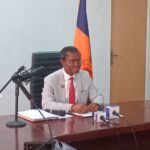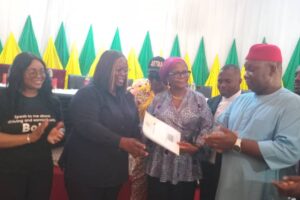The national assembly leadership has blocked the proposed electronic transmission of election results in Nigeria,CHRYSORA MEDIA learned
The lawmakers are set to pass the electoral act amendment bill, but the amendment dashes the hopes of key reforms that would come with the proposed law, according to a copy of the final bill obtained by TheCable.
The bill which seeks to repeal and re-enact the 2010 electoral act has been under consideration for years.
In 2018, President Muhammadu Buhari refused to sign it into law after arguing that it would disrupt the conduct of the 2019 elections.
Amid efforts to pass the bill early enough for the next round of general elections in 2023, the joint committees of the senate (INEC) and the house of representatives (electoral matters) set up a technical committee to work on the proposed amendment.
Among the committee’s resolutions is that voting in an election and transmission of results under the act shall be in accordance with the procedure determined by the Independent National Electoral Commission (INEC).
But the provision, contained in section 50 (2) of the bill, was modified by the leadership of both chambers in the approved version to read: “Voting in an election under this Bill shall be in accordance with the procedure determined by the Commission, which may include electronic voting, PROVIDED that the Commission shall not transmit results of elections by electronic means.”
INEC CAN’T NULLIFY ‘FORCED’ DECLARATION
Despite several complaints by INEC over its lack of power to withhold certificates of return for candidates declared election winners under duress, the national assembly removed a recommendation that empowers the commission to do so.
In 2019, the electoral umpire withheld the certificate of return of Rochas Okorocha, who it claimed was declared winner of the Imo west senatorial election under duress, but an Abuja court ruled that the electoral body has no such powers.
INEC subsequently asked the national assembly to grant it such powers in the amended electoral act, arguing that “declarations and returns must be made voluntarily and not through duress and other unwholesome practices”.
The power was granted with an additional provision in the proposed amendment — only that the provision did not make it to the final version obtained by TheCable.
National assembly blocks electronic transmission of election results
Section 65 (1) of the proposed amended act states that the decision of the returning officer shall be final on any question arising from declaration of scores of candidates and return of a candidate “provided that the Commission hall have the power within seven days to review the declaration and return where the commission determines that the said declaration and return was not made voluntarily or was made contrary to the provision of the Law, Regulation and Guidelines, and Manual for the election”.
However, the provision was deleted in the final version of the bill, effectively stripping the commission of powers to refuse to issue a certificate of return to a candidate where the returning officer was forced to declare him or her the winner.
LIMIT ON PRESIDENTIAL ELECTION EXPENSES TRIPPLED
Despite public outcry on the need to regulate election expenses to give room for candidates and political parties with little financial strength, the federal lawmakers decided to jack up the expenses for a presidential candidate by 200 percent.
Section 88 of the proposed amendment had put a limit of N5 billion and N1 billion for expenses to be incurred by a presidential and governorship candidate respectively.
Senatorial and house of representatives candidates also had a spending limit of N100 million and N70 million respectively.
But the approved version to be passed by the lawmakers raised the limit of election expenses for a presidential candidate to N15 billion while that of a governor was raised to N5 billion.
Senators and house members were also restricted to N1.5 billion and N500 million expenses respectively.












Add Comment